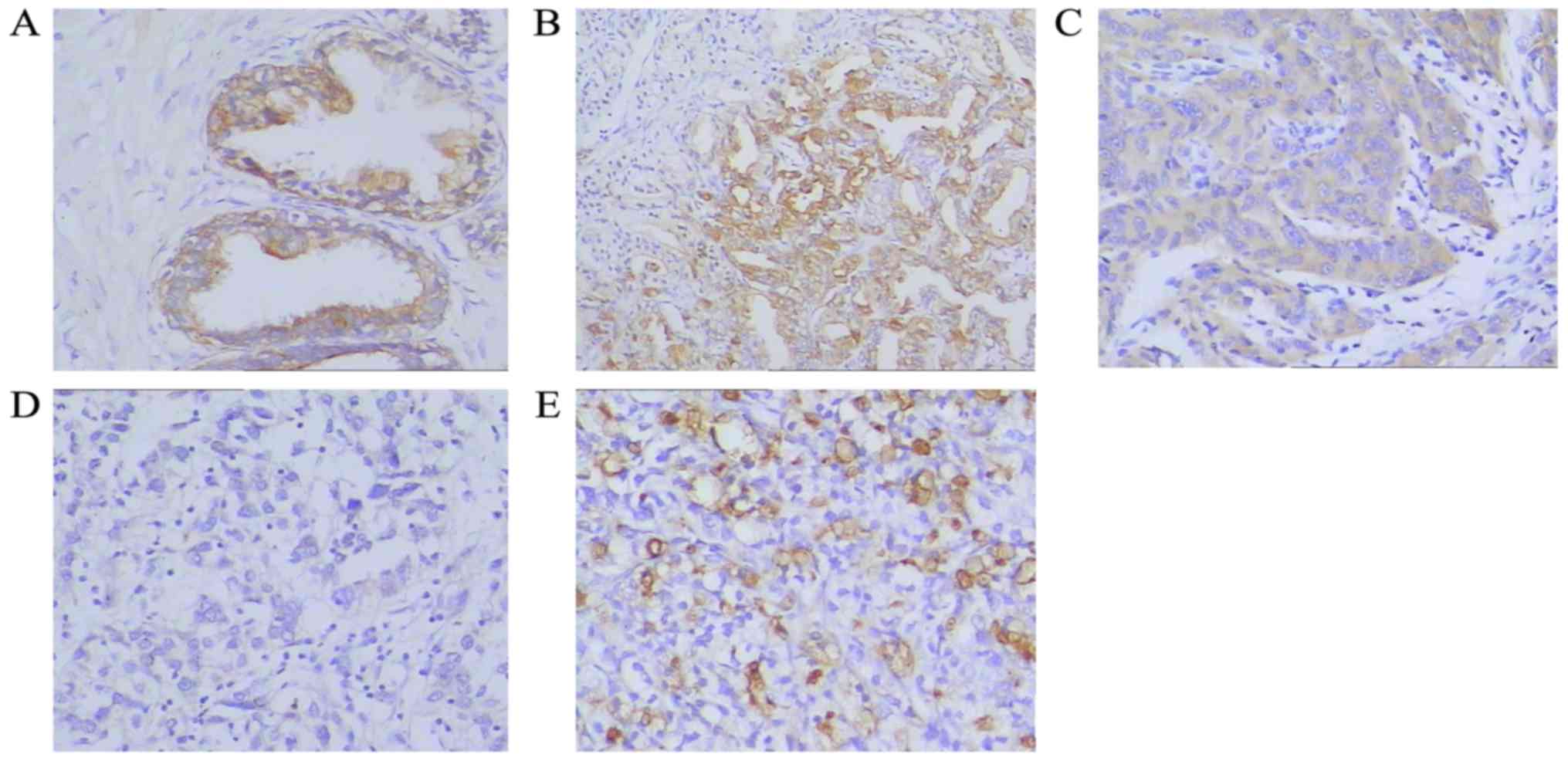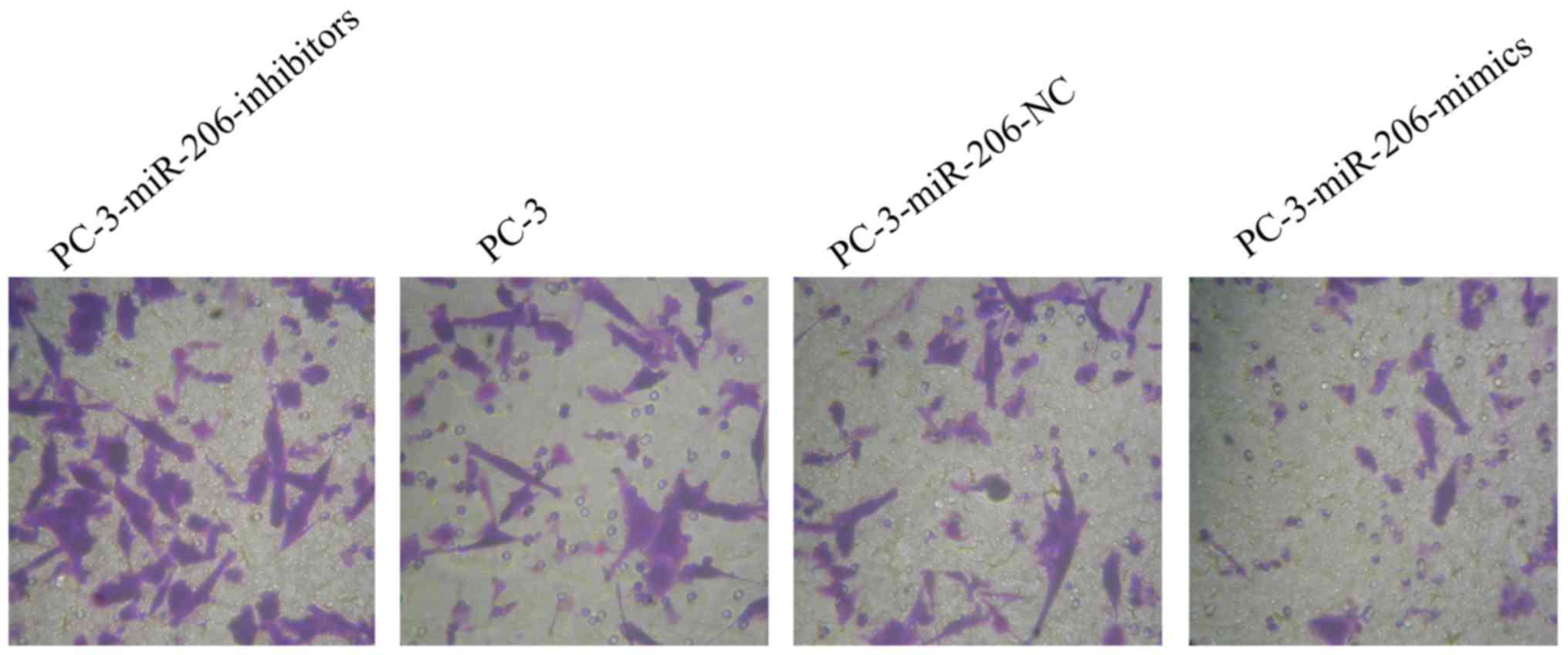|
1
|
Nandana S and Chung LW: Prostate cancer
progression and metastasis: Potential regulatory pathways for
therapeutic targeting. Am J Clin Exp Urol. 2:92–101.
2014.PubMed/NCBI
|
|
2
|
Simons JW: Prostate cancer immunotherapy:
Beyond immunity to curability. Cancer Immunol Res. 2:1034–1043.
2014. View Article : Google Scholar : PubMed/NCBI
|
|
3
|
Monastyrskaya K: Functional association
between regulatory RNAs and the annexins. Int J Mol Sci.
19:E5912018. View Article : Google Scholar : PubMed/NCBI
|
|
4
|
Mussunoor S and Murray GI: The role of
annexins in tumour development and progression. J Pathol.
216:131–140. 2008. View Article : Google Scholar : PubMed/NCBI
|
|
5
|
Mortimer JC, Laohavisit A, Macpherson N,
Webb A, Brownlee C, Battey NH and Davies JM: Annexins:
Multifunctional components of growth and adaptation. J Exp Bot.
59:533–544. 2008. View Article : Google Scholar : PubMed/NCBI
|
|
6
|
Zhang M, Chen D, Zhen Z, Ao J, Yuan X and
Gao X: Annexin A2 positively regulates milk synthesis and
proliferation of bovine mammary epithelial cells through the mTOR
signaling pathway. J Cell Physiol. 233:2464–2475. 2018. View Article : Google Scholar : PubMed/NCBI
|
|
7
|
Sun MY, Xing RH, Gao XJ, Yu X, He HM, Gao
N, Shi HY, Hu YY, Wang QX, Xu JH and Hou YC: ANXA2 regulates the
behavior of SGC-7901 cells. Asian Pac J Cancer Prev. 14:6007–6012.
2013. View Article : Google Scholar : PubMed/NCBI
|
|
8
|
Jeon YR, Kim SY, Lee EJ, Kim YN, Noh DY,
Park SY and Moon A: Identification of annexin II as a novel
secretory biomarker for breast cancer. Proteomics. 13:3145–3156.
2013. View Article : Google Scholar : PubMed/NCBI
|
|
9
|
Lokman NA, Elder AS, Ween MP, Pyragius CE,
Hoffmann P, Oehler MK and Ricciardelli C: Annexin A2 is regulated
by ovarian cancer-peritoneal cell interactions and promotes
metastasis. Oncotarget. 4:1199–1211. 2013. View Article : Google Scholar : PubMed/NCBI
|
|
10
|
Zhang HJ, Yao DF, Yao M, Huang H, Wang L,
Yan MJ, Yan XD, Gu X, Wu W and Lu SL: Annexin A2 silencing inhibits
invasion, migration, and tumorigenic potential of hepatoma cells.
World J Gastroenterol. 19:3792–3801. 2013. View Article : Google Scholar : PubMed/NCBI
|
|
11
|
Zare M, Bastami M, Solali S and Alivand
MR: Aberrant miRNA promoter methylation and EMT-involving miRNAs in
breast cancer metastasis: Diagnosis and therapeutic implications. J
Cell Physiol. 233:3729–3744. 2018. View Article : Google Scholar : PubMed/NCBI
|
|
12
|
Feng J, Fu Z, Guo J, Lu W, Wen K, Chen W,
Wang H, Wei J and Zhang S: Overexpression of peroxiredoxin 2
inhibits TGF-β1-induced epithelial-mesenchymal transition and cell
migration in colorectal cancer. Mol Med Rep. 10:867–873. 2014.
View Article : Google Scholar : PubMed/NCBI
|
|
13
|
Bezdenezhnykh N, Semesiuk N, Lykhova O,
Zhylchuk V and Kudryavets Y: Impact of stromal cell components of
tumor microenvironment on epithelial-mesenchymal transition in
breast cancer cells. Exp Oncol. 36:72–78. 2014.PubMed/NCBI
|
|
14
|
Mou H, Yu L, Zheng X, Liao Q, Hou X and Wu
Y: p16 gene expression in pancreatic cancer tissue and its
importance in diagnosis. J Biol Regul Homeost Agents. 31:1043–1047.
2017.PubMed/NCBI
|
|
15
|
Luo S, Xie C, Wu P, He J, Tang Y, Xu J and
Zhao S: Annexin A2 is an independent prognostic biomarker for
evaluating the malignant progression of laryngeal cancer. Exp Ther
Med. 14:6113–6118. 2017.PubMed/NCBI
|
|
16
|
Murphy AG, Foley K, Rucki AA, Xia T,
Jaffee EM, Huang CY and Zheng L: Stromal Annexin A2 expression is
predictive of decreased survival in pancreatic cancer. Oncotarget.
8:106405–106414. 2017. View Article : Google Scholar : PubMed/NCBI
|
|
17
|
Shetty P, Patil VS, Mohan R, D'souza LC,
Bargale A, Patil BR, Dinesh US, Haridas V and Kulkarni SP: Annexin
A2 and its downstream IL-6 and HB-EGF as secretory biomarkers in
the differential diagnosis of Her-2 negative breast cancer. Ann
Clin Biochem. 54:463–471. 2017. View Article : Google Scholar : PubMed/NCBI
|
|
18
|
Cui JW and Wang YL: Expression and
function of Annexin II in lung cancer tissue. Asian Pac J Trop Med.
6:150–152. 2013. View Article : Google Scholar : PubMed/NCBI
|
|
19
|
Dong Z, Yao M, Zhang H, Wang L, Huang H,
Yan M, Wu W and Yao D: Inhibition of Annexin A2 gene transcription
is a promising molecular target for hepatoma cell proliferation and
metastasis. Oncol Lett. 7:28–34. 2014. View Article : Google Scholar : PubMed/NCBI
|
|
20
|
Kirshner J, Schumann D and Shively JE:
CEACAM1, a cell-cell adhesion molecule, directly associates with
annexin II in a three-dimensional model of mammary morphogenesis. J
Bio Chem. 278:50338–50345. 2003. View Article : Google Scholar
|
|
21
|
Yee DS, Narula N, Ramzy I, Boker J,
Ahlering TE, Skarecky DW and Ornstein DK: Reduced annexin II
protein expression in high-grade prostatic intraepithelial
neoplasia and prostate cancer. Arch Pathol Lab Med. 131:902–908.
2007.PubMed/NCBI
|
|
22
|
Ohno Y, Izumi M, Kawamura T, Nishimura T,
Mukai K and Tachibana M: Annexin II represents metastatic potential
in clear-cell renal cell carcinoma. Br J Cancer. 101:287–294. 2009.
View Article : Google Scholar : PubMed/NCBI
|
|
23
|
Zhang W, Zhao P, Xu XL, Cai L, Song ZS,
Cao DY, Tao KS, Zhou WP, Chen ZN and Dou KF: Annexin A2 promotes
the migration and invasion of human hepatocellular carcinoma cells
in vitro by regulating the shedding of CD147-harboring
microvesicles from tumor cells. PLoS One. 8:e672682013. View Article : Google Scholar : PubMed/NCBI
|
|
24
|
Oh M, Rhee S, Moon JH, Chae H, Lee S, Kang
J and Kim S: Literature-based condition-specific miRNA-mRNA target
prediction. PLoS One. 12:e01749992017. View Article : Google Scholar : PubMed/NCBI
|
|
25
|
Dweep H, Sticht C, Pandey P and Gretz N:
miRWalk-database: Prediction of possible miRNA binding sites by
‘walking’ the genes of three genomes. J Biomed Inform. 44:839–847.
2011. View Article : Google Scholar : PubMed/NCBI
|
|
26
|
Xiao H, Xiao W, Cao J, Li H, Guan W, Guo
X, Chen K, Zheng T, Ye Z, Wang J and Xu H: miR-206 functions as a
novel cell cycle regulator and tumor suppressor in clear-cell renal
cell carcinoma. Cancer Lett. 374:107–116. 2016. View Article : Google Scholar : PubMed/NCBI
|
|
27
|
Ren XL, He GY, Li XM, Men H, Yi LZ, Lu GF,
Xin SN, Wu PX, Li YL, Liao WT, et al: MicroRNA-206 functions as a
tumor suppressor in colorectal cancer by targeting FMNL2. J Cancer
Res Clin Oncol. 142:581–592. 2016. View Article : Google Scholar : PubMed/NCBI
|
|
28
|
Keklikoglou I, Hosaka K, Bender C, Bott A,
Koerner C, Mitra D, Will R, Woerner A, Muenstermann E, Wilhelm H,
et al: MicroRNA-206 functions as a pleiotropic modulator of cell
proliferation, invasion and lymphangiogenesis in pancreatic
adenocarcinoma by targeting ANXA2 and KRAS genes. Oncogene.
34:4867–4878. 2015. View Article : Google Scholar : PubMed/NCBI
|
|
29
|
Chen L, Li YS, Cui J, Ning JN, Wang GS,
Qian GS, Lu KZ and Yi B: MiR-206 controls the phenotypic modulation
of pulmonary arterial smooth muscle cells induced by serum from
rats with hepatopulmonary syndrome by regulating the target gene,
annexin A2. Cell Physiol Biochem. 34:1768–1779. 2014. View Article : Google Scholar : PubMed/NCBI
|
|
30
|
Scanlon CS, Van Tubergen EA, Inglehart RC
and D'Silva NJ: Biomarkers of epithelial-mesenchymal transition in
squamous cell carcinoma. J Dent Res. 92:114–121. 2013. View Article : Google Scholar : PubMed/NCBI
|
|
31
|
Martínez-Ramírez AS, Garay E,
García-Carrancá A and Vázquez-Cuevas FG: The P2RY2 receptor induces
carcinoma cell migration and EMT through cross-talk with epidermal
growth factor receptor. J Cell Biochem. 117:1016–1026. 2016.
View Article : Google Scholar : PubMed/NCBI
|
|
32
|
Carvalho-Cruz P, Alisson-Silva F,
Todeschini AR and Dias WB: Cellular glycosylation senses metabolic
changes and modulates cell plasticity during epithelial to
mesenchymal transition. Dev Dyn. 247:481–491. 2018. View Article : Google Scholar : PubMed/NCBI
|
|
33
|
Kaushik NK, Kaushik N, Yoo KC, Uddin N,
Kim JS, Lee SJ and Choi EH: Low doses of PEG-coated gold
nanoparticles sensitize solid tumors to cold plasma by blocking the
PI3K/AKT-driven signaling axis to suppress cellular transformation
by inhibiting growth and EMT. Biomaterials. 87:118–130. 2016.
View Article : Google Scholar : PubMed/NCBI
|
|
34
|
Yu AQ, Ding Y, Li CL, Yang Y, Yan SR and
Li DS: TALEN-induced disruption of Nanog expression results in
reduced proliferation, invasiveness and migration, increased
chemosensitivity and reversal of EMT in HepG2 cells. Oncol Rep.
35:1657–1663. 2016. View Article : Google Scholar : PubMed/NCBI
|
|
35
|
Chen HN, Yuan K, Xie N, Wang K, Huang Z,
Chen Y, Dou Q, Wu M, Nice EC, Zhou ZG and Huang C: PDLIM1
Stabilizes the E-Cadherin/β-Catenin complex to prevent
epithelial-mesenchymal transition and metastatic potential of
colorectal cancer cells. Cancer Res. 76:1122–1134. 2016. View Article : Google Scholar : PubMed/NCBI
|


















